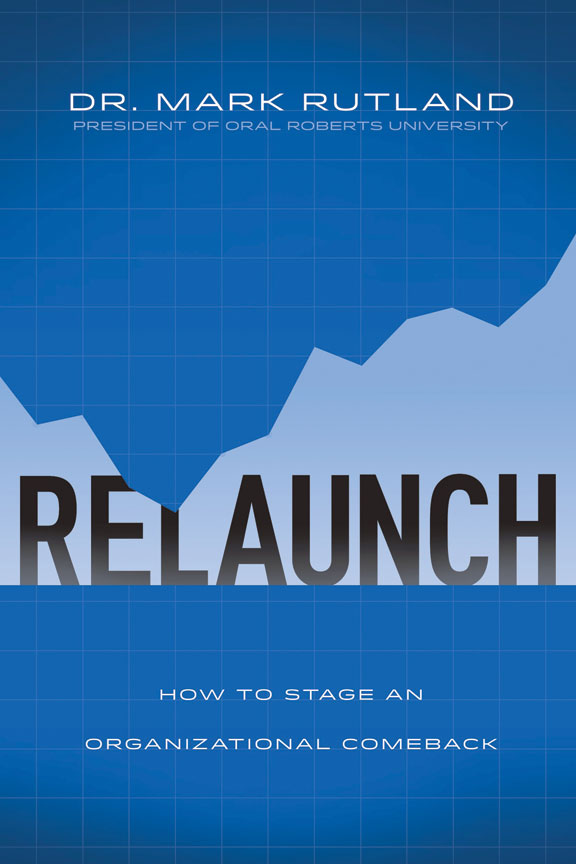 |
| ReLaunch: How to Stage an Organizational Comeback by Mark Rutland (David C. Cook, 2013, 208 pp., $17). |
It is not every Christian leadership author who, in a chapter about firing people, quotes Virgil “The Turk” Sollozzo from The Godfather. And it’s a quote with the word “blood” in it.
But that’s just one of many bold and challenging nuggets in Mark Rutland’s ReLaunch: How to Stage an Organizational Comeback.
Rutland, turnaround champion of a large church, a college, and — most recently — Oral Roberts University, presents turnaround leadership as a set of skills that can be developed. “It is a matter of vision,” he says, “and of seeing opportunity where everyone else sees an unmanageable mess.”
The immensely readable book presents seven steps to an organizational turnaround and then a blueprint for building a turnaround team. This, of course, requires both hiring and firing, which are difficult topics in Christian institutions where a culture of “nice” can let people languish in the wrong jobs for years.
Rutland shares what he learned from what went well and what went wrong. Readers can learn from his mistakes — such as when Rutland poured his energies into the small group structure of a church, only to discover that what he had been doing was a waste of time and resources. But what followed set his church on the path to revitalization.
Another error: hiring someone whom he soon discovered to be the wrong person. When he fired the new hire shortly afterwards, he knew it was ultimately the best thing for the organization and the shocked employee as well. Seminary board members will be particularly interested in chapter 14, “Forming a Board.” You can decide if you are good, bad, or ugly.
Rutland is a crisp, clean writer. He makes reference to Eisenhower, Colonel Sanders, 1620s Sweden, the NFL, Oldsmobiles, and the Allies in spring of 1945, among many other leadership metaphors, most of which work very well. There is one about a room with magnetic walls that was a stretch for me. But the mayonnaise illustration that comes a bit later on redeems it.
Rutland writes well. He clearly leads well.
Say thanks, know your stuff, build trust
An interview with ReLaunch author Mark Rutland
Q What can typically go wrong with boards that might contribute to the need for an organizational relaunch?
A In the book I talk about good, bad, and ugly boards. The bad and the ugly boards overreach and cause tension rather than resolve it. They stretch into management. Or — and this is more common with founder boards — they are the “yeah, yeah” boards, the “when do we eat?” boards.
Founder boards allow the situation to be driven into the ditch; the other boards clamp the valves shut through overreaching.
Q How does a turnaround leader work with a board that needs improvement?
A I think that the hope for the leader is relational leadership — to build trust, to try to bring balance. With the more intrusive board, that means going slowly, saying, “Look, you don’t want to go there. You’re overstepping your bounds.” The president that takes the role seriously has a concern for setting precedents: “If I cede to this, then I’m establishing a culture here that the next president will have to live with.” Getting your back up and fighting probably doesn't help. The greater hope is the leadership of influence and relationship building.
Q In the book you talk about leaders saying “thank you” a lot, sending frequent notes or messages of appreciation. You also mention the board doing that for the leader. Can you tell us more about that?
A Leaders, in a kind of genuine and authentic modesty, underestimate what their personal gratitude and affirmation means to their followers. The lady who cleans the floors in the men’s dorms — if you stop her and say, “Agnes, nobody does this like you do it,” that probably doesn't mean much to you, but no one has ever said that to her. I was slow to understand the impact of that.
With regard to the leader and the board: On the one hand, you don’t want to turn him into an applause-addicted, ego-driven guy. But at the same time, all the hard questions that have to be asked in board meetings — questions like “What about this?” and “Why didn't we meet this goal?” — all these can create a subtle adversarial undercurrent, if not an actual accusatory undercurrent. What can soften that? The board saying, “We need you to know you are doing a great job.”
If you don’t do it, it diminishes risk taking. It trickles down through the whole administration. Instead of asking, “What is the right thing to do?” they ask, “What will the board think?”
I think boards may be afraid that if they offer too much praise, they will be pumping up the president’s ego so much that no one will be able to tolerate him. What they don’t understand is that there are many people just waiting with pins to burst that ego every day.
Q You mention that faith-based organizations can be the most difficult to relaunch. Why is that?
A I’m sure this will offend people, but one of the reasons is because in an entirely secular context, there are a lot of questions that don’t have to be asked or answered.
You don’t have to ask, “What does God think about this?” You’re not concerned about the spiritual climate.
I believe being a president of a seriously Christian institution is the most complicated business in the education world, both “vertically” and “horizontally.” The president of Ohio State is not even supposed to be concerned about the spiritual climate in the dorm. The prayer life of his faculty is not on his job description.
Q What do you think are the most important lessons a board can take from ReLaunch?
A Knowledgeable board members are of great benefit to the institution. I never fail to be shocked at board members who can’t read the spreadsheet, can’t understand the financial reports, and ask questions in board meetings that are elementary.
I was in a board meeting once and one member asked, “Are you saying we own this asset?”
Meeting after meeting we had reported on that asset! And you think, “Are we in the same room here?”
So, be knowledgeable. But don’t let that knowledge translate into invasive action.
Board members who overstep — they are a challenge. It’s very difficult for the president to say to the chair, “You've got to keep your dogs in your own yard.” Then the president feels defensive, which you don’t want.
I've had board members call members of my staff and give directives. Then the staff don’t know who they are working for.
If the board members will move toward the president relationally, it can ease so many things.